Rand Fishkin: Earlier this year, Dani Sullivan from Third Door Media asked me to conduct a comparative analysis of the ranking elements of Google and Bing on , so that SEO users can take this data into account when optimizing.
I made a presentation of this research at the SEO Conference "SMX Advanced" in Seattle. In this article I will tell the same thing, but in more detail.
We also already had a more recent study on the blog, “The main differences of promotion in Microsoft Bing compared to Google.”
In the article, I used graphs and data directly from the conference presentation, so you can use them in your presentations in front of clients or to motivate your own team. But before I begin, I want to share with you information that cannot be overlooked.
Objectives of the study:
1. Give a new understanding to SEOs of how Google and Bing rank pages.
2. Give a more scientific approach to SEO with the help of data verified by experts
3. To give recommendations on the conclusions made by you, and also to draw conclusions for others.
Further research, including causal analysis of a more detailed ranking model and analysis of other factors, are also part of our objectives.
Method:
- We collected data on 11,351 search queries from Google and Bing using Google AdWords on various topics.
- We took data only from the first page of issue, which usually includes 10 sites, but sometimes this number may vary. We didn’t include all non-standard results (implied video search results, pictures of local or instant answers).
- A relationship was made between higher / lower search engine results on the first page.
- We carefully monitored the issue results by parameters. For example, if we were interested in the data for the .gov domain and there was not a single domain in the issue in this zone, then we did not include this data.
- We used the Spearman coefficient, since it is standard (and in our opinion the best) for ranking data.
The technique we used is very similar to the one we used in a recent Google PR study.
Understanding the Meaning of Relationship
Relationship data ranged from -0.2 to 0.35, where the ideal relationship is 1.
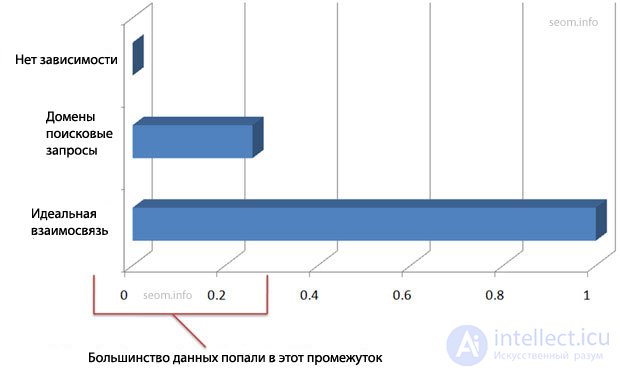
Standard errors for each result were also included, but they are so minor that they are not noticeable on the graph. All this is due to the large number of collected results, which gives us greater confidence.
Relationship ≠ causality
Statistical analysis has long believed that a relationship does not always mean that one information is a consequence of another. People walking with an umbrella do not cause rain. Selling ice cream does not cause hot weather.
The longer I wear a suit, the longer I talk about SEO. Does wearing a suit mean talking about SEO?
It is very important to understand that the information presented needs in-depth study and analysis. If you consider relationships in such a way that X needs to be done more than Y, then you are mistaken.
Understanding negative correlation
In the data below, you will see examples of negative correlation, which means the following: we see elements that cause lower results in the output. For example:
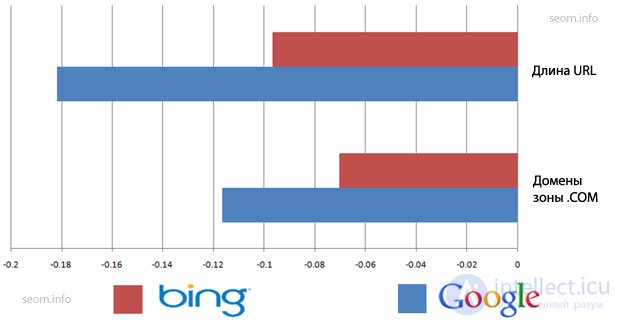
Data on the length of the URL shows that the longer the URL, the worse it affects the ranking. This is not surprising, and it would be correct if you shortened the length of your URL, for better results in search engines.
However, the second graph shows that the use of the .com domain zone does not necessarily have a negative impact on the promotion, but sometimes such domains may be worse than others.
A little later, we will share our reasoning, but for now draw your own conclusions.
In the past, we tried to examine the search engine, and not the issue, and very often the negative correlation turned out to be positive (or neutral).
Queries matching the domain name
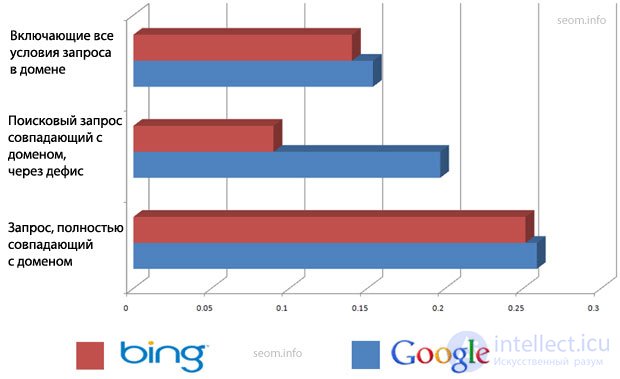
Our interpretation of this data and conclusions:
- Search domains still remain influential in both search engines, although many SEO users are surprised, but Google "likes" such domains more than Bing.
- Search domains with hyphenated names have less influence, although there are more of them (we received 271 domains on Google and 890 on Bing).
- Even if part of the domain name matches the keyword, it also has a positive effect on promotion (for example, if I want to promote the query "dog", then the domain mydog.com will be suitable for promotion).
Domain Search Queries by Domain Zones
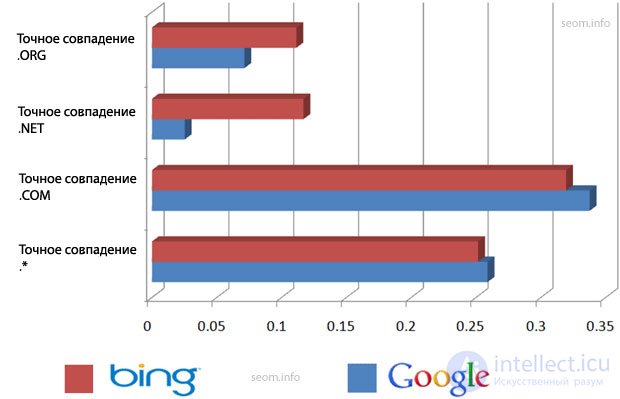
Our interpretation of this data and conclusions:
- The best domain zone to promote a domain search query will be .com. The remaining zones have approximately the same effect.
- Bing is more loyal to non-.com domain zones than Google (especially in the case of .org)
Keywords in subdomains
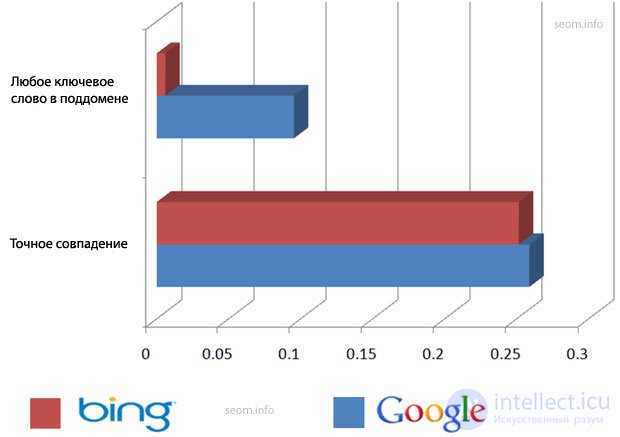
Our interpretation of this data and conclusions:
- keywords in subdomain names are not so powerful as domains themselves
- Bing may refer to keyword subdomains less loyally than Google, although there are more of them in the Bing issue (Google: 673, and in Bing: 1.394)
Keyword density per page
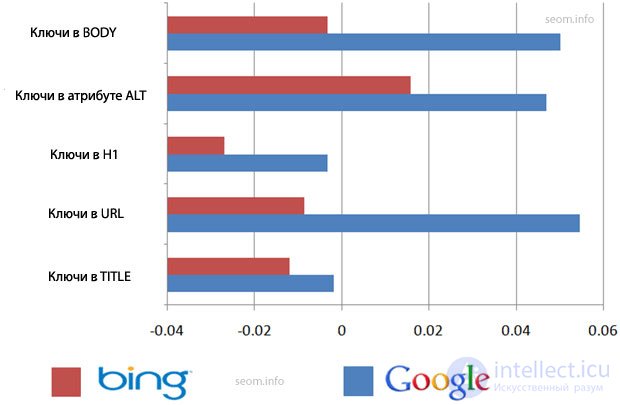
Our interpretation of this data and conclusions:
- the use of the alt attribute in images is very interesting - as our research showed last year, this excellent feature works in both search engines
- The use of keywords in a URL has some effect on ranking in Google, although this feature may be lost when using text link anchors.
- Note the “0” mark on the axis - these are negative correlations, although not numerous. All correlations are located here in a very short interval.
- All sites seem to have optimized title tags, since the difference is not great (Google: 11,115, Bing: 11,143)
- Regular keyword page optimization has almost no effect on ranking.
The number of links and their diversity
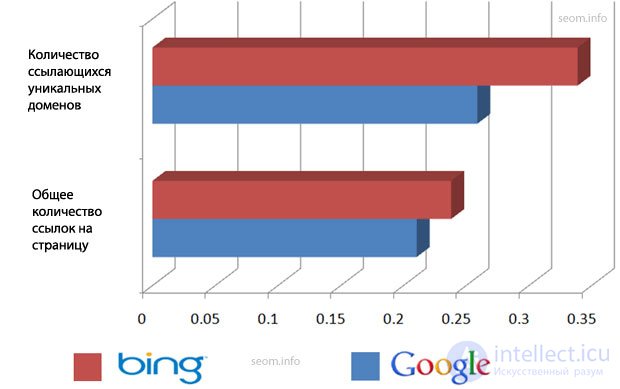
Our interpretation of this data and conclusions:
- Links are still a major factor in ranking. This data is the highest on average.
- Bing, in comparison with Google, is more naive with respect to links, but over the past year it has managed to significantly improve the link indexing algorithm.
- A variety of unique referring domains is much more important than the total number of links.
Second level domains
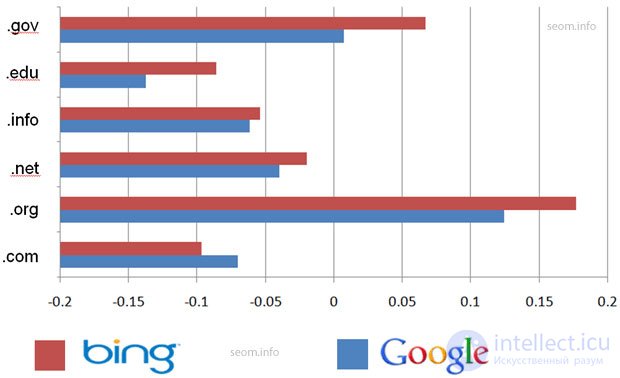
Our interpretation of this data and conclusions:
- This data once again confirmed the words of the head of the anti-spam department of Google, Matt Cutts, that the .gov, .info and .edu domains do not have any special privileges when ranking, or sanctions.
- The data for the .org domains turned out to be surprising - do these sites get more links? Less spam? Perhaps the sites in this zone are less commercial? Be that as it may, we are happy that we are .org!
- Do not forget that the .com zone is still very good.
Length of domain name, URL and content
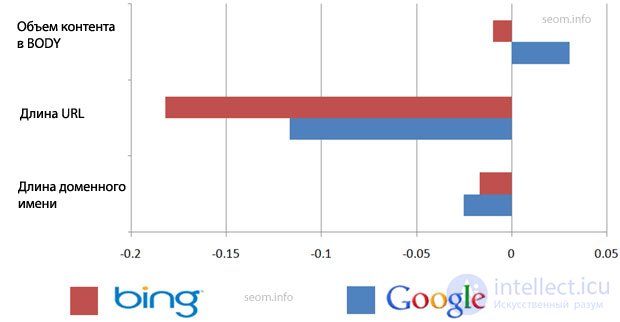
Our interpretation of this data and conclusions:
- The shorter the domain name, the better (especially with Bing)
- Long domain names may not be perfect, but there's nothing wrong with that.
- Content length affects the ranking, which coincided with the words of Matt Cutts:
"Do not overfill the page with content for the sake of search engines. They don't need a whole dissertation for better ranking; they need the same thing that users need - a useful, easy to use and informative site."
Main pages of sites
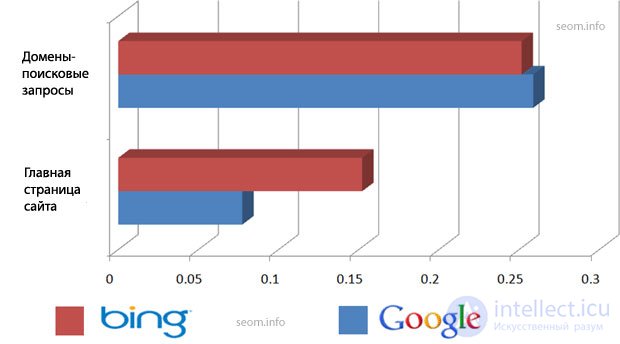
Our interpretation of this data and conclusions:
- Bing attaches greater importance to the main page of the site, unlike Google, which showed a comparative analysis, where the ranking of the main page in Bing is twice as high as Google (note that we included site.com/, site.com/index in this data. *, site.com/default.* and site.com/home.*)
Link text anchors
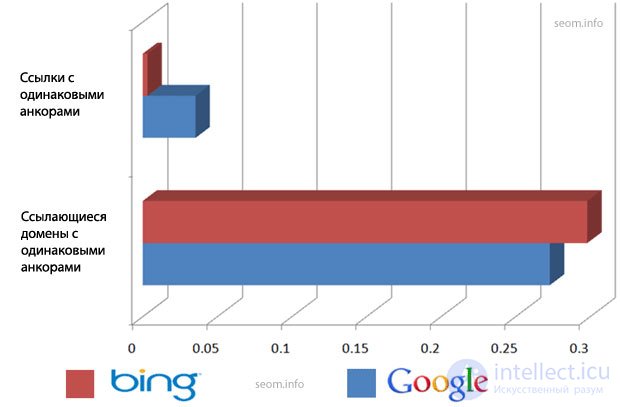
Our interpretation of this data and conclusions:
- A large number of links with text anchors from one domain do not give much weight.
- Links with text anchors from different domains are the most matching parameters of the two search engines.
- Bing seems to be more similar to Google when ranking search-based queries with text anchors.
The most similar elements of Google and Bing when ranking
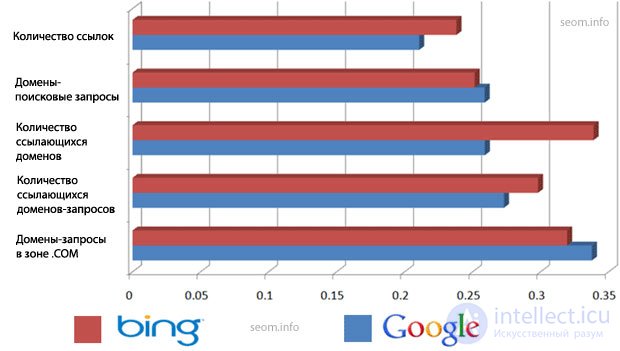
Our interpretation of this data and conclusions:
- In general, link attributes have a greater impact on ranking than page optimization or domain settings
- Matching the search query with the domain name is still an influential factor.
- Google and Bing are very similar - so creating two pages or sites optimized for each of these search engines will be a waste of time and effort.
- Over time, it seems that Bing is getting closer to Google. Last year, we didn’t measure exactly all these parameters, but it’s noticeable that search engines are rapidly becoming similar (Of course, it’s possible that Google becomes like Bing and not vice versa, but this goes against our experience).
Please share your research, analytics, suggestions in the comments.












Comments
To leave a comment
seo, smo, monetization, basics of internet marketing
Terms: seo, smo, monetization, basics of internet marketing